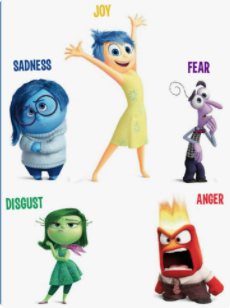You don’t!
I’ve lost count of the times that I’ve been asked this question. And if I’m truly honest, I’ve caught myself asking the very same question! And yet, it really isn’t helpful.
As humans, we’re emotional beings. Our first reactions are emotional ones. Did you ever watch the film Inside Out?

If you haven’t watched it, it’s worth a watch (but then I am a Disney Pixar fan!) I won’t give the story away, but in the film you see how emotions drive behaviour in a child. And this is the same for all of us at any age. The difference between an adult and a child is experience. Over time we gain experience of different events and we learn to choose our reaction. If you have children or you’ve been with children, you will see this playing out before your eyes.
One of the things I’ll never forget is that time I had to take my baby boy (he’s 21 now!) to have his first set of vaccinations. He was happy in my arms. The nurse came over with the needle and he was still happy in my arms. Then she put the needle in his leg… At first there was no reaction, it’s like he was holding his breath. Then he looked at me and wailed!
The next time I had to take him for his vaccination, as soon as he saw the nurse coming towards him, he started to fidget and cry and that soon turned into a scream even before the needle went in!
First time around he had no idea what all of this was. Second time around he did and his behaviour was driven by fear.
Now this fear continued until he had to have a vaccination at school – by that stage peer pressure crept in and he couldn’t be seen to be scared at school.
As an adult he still has fear but his reaction to it is different. He doesn’t scream or cry. He turns his head, looks away and grits his teeth.
Now this was just one example amongst many that I’ve seen play out before me.
You will definitely have some of your own. How did you feel the first time you had to stand up in front of a group of people and do a presentation? How has your reaction changed over time?
Essentially, what we need to focus on is handling and managing our reaction to our emotions. And to do that we need to practice.
Step 1. Notice the emotion and notice the reaction. Where in your body do you first feel the emotion? What do you do?
Step 2. Choose what reaction you would like, what is your preferred response
Step 3. Put yourself in situations which will require you to practice
Step 4. Review your progress each time
Over time, you will learn to have a different reaction.
What reaction or behaviour do you want to change? What opportunities are you creating for practice?
Let me know below and head over to my facebook page SoniaGavira where you can also get more leadership tips
